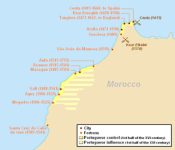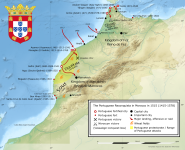From my admittedly superficial knowledge of early modern Spanish history, it would seem that one reason Spain's conquest of the Americas was so violent was that its nobility was still in Reconquista mode after completing the expulsion of the Muslims and Jews from the Iberian peninsula, and hungered for more land to claim. So, if for whatever reason the "official" discovery of the Americas was delayed by a few decades, would Muslim North Africa be the main target of its expansionist drive? It seems that immediately after the fall of Granada, the Spanish crown saw the weak polities of the Maghreb as ripe for conquest:
After the Catholic Monarchs' conquest of the Nasrid Kingdom of Granada in 1492, their Secretary Hernando de Zafra compiled information about the sorry state of the north African coast with the prospect of a potential territorial expansion in mind, sending field agents to investigate, and subsequently reporting to the Catholic Monarchs that, by early 1494, locals had expelled the authority of the Sultan of Fez and had offered to pledge service. While the 1494 Treaty of Tordesillas put Melilla and Cazaza (until then reserved to the Portuguese) under the sphere of Castile, the conquest of the city had to wait, delayed by Charles VIII of France's occupation of Naples.



